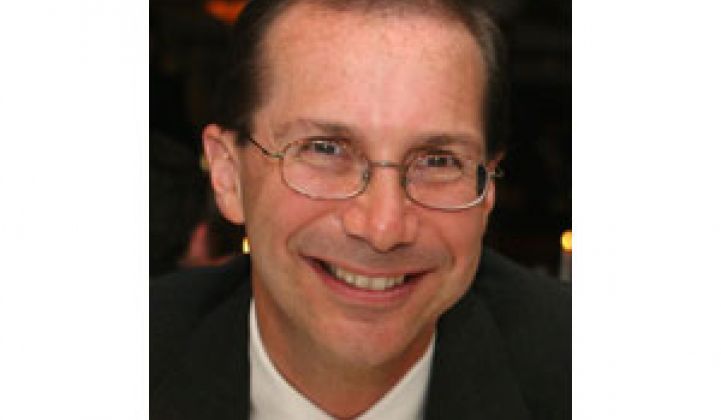While most of us were trying to navigate our way through the social and academic experiments of high school, Bill Gross spent his extracurricular time building Solar Devices, a firm that sold solar-power plans and kits.
Then, while studying mechanical engineering at the California Institute of Technology, he patented a new loudspeaker design and formed yet another company called GNP Loudspeakers.
The powerhouse serial entrepreneur also founded Knowledge Adventure, an educational software publisher that grew to be the third largest educational software publisher in the world. The company was eventually sold to Cendant Software and Gross went on to create pay-per-click firm GoTo.com, eventually renamed Overture, which was acquired by Yahoo for $1.6 billion in 2003.
These days, Gross is CEO of Pasadena Calif.-based incubator Idealab, which he founded in 1996.
On Monday, Idealab, along with investors Google.org, Oak Investment Partners and others doled out a whopping $130 million in funding to concentrating solar-thermal developer eSolar. Gross is also chairman for the Pasadena Calif.-based solar company.
eSolar plans to produce electricity using fields of mirrors that direct sunlight toward a tower of liquid that creates steam, which is then converted into electricity.
eSolar isn't the only company looking to make utility-scale solar electricity from heat instead of sunlight, of course. This week, Phoenix-based Stirling Energy Systems announced it had raised $100 million for solar-thermal technology that uses engines to produce electricity.
We caught up with Gross to discuss his latest investment, get his take on increased competition among solar-thermal players and find out whether or not large funding deals like eSolar’s contribute to an overvaluation in the solar sector.
Q: What is the biggest challenge facing the solar industry today?
A: The main thing I would say is everybody needs to focus on driving the cost down. The only way we are going to get the big adoption with no subsidies is if we can beat the price of fossil fuels.
Right now, when you are competing against fossil fuels you are competing against a technology that is fully at scale after 100 years of subsidies and development. Now you have to come in with a new technology and fight against it. That makes it hard, but it doesn't make it impossible. It places a very big challenge on technological innovation.
Q: eSolar raised a huge chunk of change. Why does the company need so much money?
A: Power plants are very expensive. Typically, when people build new technologies they have to go get bank financing so they can fund them. Because we were able to raise enough money based on the quality of the technology to fund the plants directly, we don't have to wait for the long periods to achieve financing. We can just begin construction immediately.
Q: A lot of other solar-thermal companies are aggressively pushing forward right now, like Stirling Energy Systems, which raised $100 million this week. Are you concerned with how eSolar will fair against the competition?
A: I feel very confident that solar thermal is the most powerful solution to the world's energy and in particular electricity needs. I think this funding to both us, Stirling Energy Systems and to one of Idealab's other company Infinia, which just raised more than $50 million, is not even enough. The demand is so overwhelming that I don't look at any of these companies as competition.
Q: What is eSolar's key technological differentiator?
A: It's a solar-thermal power plant that is completely pre-fabricated. We build the entire plant in a factory and then bring it to the field and roll it out. It removes all the civil construction and the extensive labor at the site and moves it to a robotic factory.
We use 100,000 flat mirrors to concentrate sunlight as opposed to approximately 500 huge curved mirrors. By using small flat mirrors we can avoid a huge part of the expense that comes from steel and concrete and cranes and instead replace it with very inexpensive microprocessors that do all the computation to move every mirror all day long and all year long to precisely concentrate the sunlight.
Q: With all of these large equity deals, some investors have speculated that solar companies’ valuations are too high. With companies like eSolar raising $130 million, is there any truth to this idea?
A: It is very difficult to place a proper valuation on these companies when they are at an early stage, because the market potential is so huge. Obviously, if the companies cannot deliver, then maybe a valuation today could be too high. But if the companies can deliver on the promise of solar electricity at prices lower than fossil fuels, then I actually think we will look back on today's valuations as being way too low.
Solar

Q&A: Bill Gross Puts a Shine on Solar
Idealab CEO Bill Gross, who helped concentrating solar-thermal company eSolar raise $130 million this week, says he doesn't think solar companies are overvalued.

Q&A: Bill Gross Puts a Shine on Solar
-
41Where Will DOE’s Loan Program Make the Next Climate Tech Investments?
-
15What the Frack Is Happening With Natural Gas Prices?
-
9With an Energy Crisis Brewing, No Peak in Sight for Emissions


